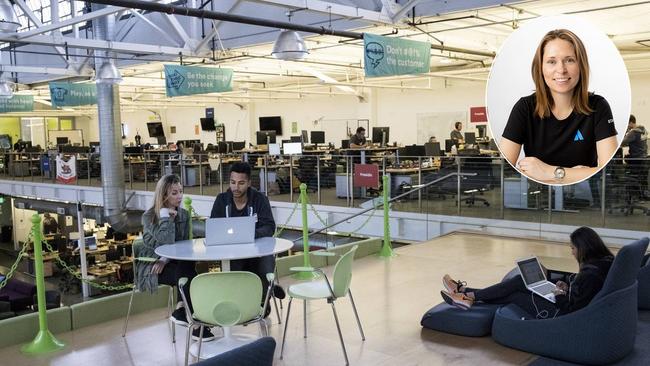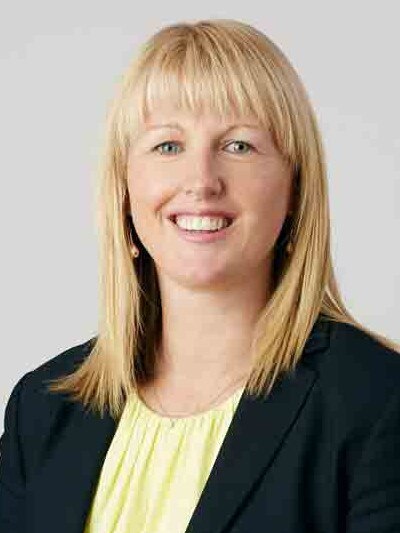The problem with the four-day work trend: Atlassian
People want more flexibility to do their jobs, but offering a four-day working week is not the answer, according to Atlassian executive Annie Dean.

One of the earliest adopters of remote working, software giant Atlassian, has pushed back against the growing fad of companies offering staff four-day work weeks with no loss of pay, saying it presents the view that staff working from home want to work less.
Atlassian trialled a four-day working week in 2022 and, while it said three-day weekends were “awesome” and “restorative”, it didn’t implement the change permanently.
Eighteen months later, Annie Dean, who heads Atlassian’s distributed work strategy, said the focus should be on output, not how many days an employee works or where they complete that work.
“The thing that is relevant in this conversation is that employee preferences will impact how businesses operate and there’s consensus from employees that they are looking to spend more of their time living, as opposed to working,” Ms Dean told The Australian on the sidelines of Atlassian’s annual Team conference in Las Vegas.
“That is a really important message to hear as we consider how to build a more human way to work in our corporations. However, I’m not a big proponent of the four-day work week.
“For instance, by giving people back the opportunity to commute, you save five weekends per year – you’ve got a great opportunity to reinvest time. I don’t want it to seem like that, by suggesting employees deserve flexibility, that they’re asking to work less. And I think sometimes that message gets tied up in the four-day work week.”
But other companies are ploughing ahead with exploring the new working method.
Medibank is halfway through a four-day work week trial and, rather than staff working less, it says productivity is unchanged, while sick and carers leave has been slashed by two-thirds.
Telstra, NIB, Grant Thornton and others have also either similar plans or are cementing their shift to hybrid working, sparked during the Covid-19 pandemic, heralding one of the biggest changes to office work in decades.
But other companies, such as Commonwealth Bank and National Australia Bank, are leaning more the other way, ordering staff to less time working at home and more time in the office.
‘Red herring’
Ms Dean criticised office mandates as a “red herring”, saying it presented similar problems to the four-day work week.
“Everyone just wants to make an impact on their outcomes. So I’m open to anyone talking about the future of work, and I’m excited to see how those experiments go,” she said. “But for me, I’m really thinking about time savings delivered through having more choice on where work happens.
“Office mandates are a red herring. Every company should be thinking about how to work differently in this environment – using AI, using new tools and new practices that solve the problems of modern work today. And if teams can work differently, it’s clear that where work happens doesn’t matter. That’s the missing insight that a lot of CEOs don’t have today.”
Ms Dean’s boss, Atlassian co-founder and co-CEO Mike Cannon-Brookes, says remote arrangements work if people “don’t hire idiots” and those employees are managed well. He said some of return to office mandates stem more from commercial real estate decisions, rather than what’s better for the companies, raising the question of what problem they’re really trying to solve.
Ms Dean said Atlassian focused on giving employees choice, including providing office space to ensure they remained productive and generated their best work.
“We have spent a lot of time making sure that we have an efficient real estate portfolio and that those real estate offerings or office offerings are compelling, that people want to come to them – they’re healthy, they’re vibrant,” she said.
“And people are coming to the office. Eighty per cent of people are coming every quarter despite the fact that 40 per cent of people at the company can’t easily access an office. So it’s impressive that people feel drawn to and excited about coming to visit as opposed to being mandated to be there.”
Promising results
Australia’s biggest health insurer, Medibank, has been a big proponent of flexible working and is currently more than halfway through a trial of a four-day work week, with no loss of pay.

Medibank group lead for people, spaces and sustainability Kylie Bishop said the company had been trialling the new work method for about 11 weeks and, while it was early days, it had seen some “promising results”.
Productivity was unchanged, while sick and carers leave had been slashed by two-thirds, Ms Bishop said.
“From a health and wellbeing perspective, we are seeing stress levels reducing in participants as time has gone on, which is an important indicator to make sure we aren’t doing a compressed work week,” Ms Bishop said.
While Ms Bishop and Ms Dean have different views on the four-day work week, they also share some common ground, namely reducing time wasted in meetings, advocating more asynchronous work and using collaborative software – including Atlassian’s Jira and Confluence – to track projects and performance.
“We know that optimising meetings is a key enabler to changing how we work and unlocking time, for example, reducing the number of meetings, the number of attendees, duration, and also how they’re conducted,” Ms Bishop said.
“We’re seeing teams use technology a lot more, tools for asynchronous collaboration like the integrated O365 tool set, and rather than join a meeting to share an update, they might record a quick video and post it on one of the MS Teams sites.
“Teams are encouraged to make these decisions for themselves as to how they work and which tools they use for collaboration, including tools like Confluence and Jira.”
This included what Ms Bishop said was “being smart in how we’re using AI”.
“Our talent acquisition team is using a tool called Calendly to unlock some of their time. Rather than going back and forth with a candidate to lock in a suitable interview time, candidates can use the tool to choose an available time that suits them,” she said.
The author travelled to Las Vegas as a guest of Atlassian.








To join the conversation, please log in. Don't have an account? Register
Join the conversation, you are commenting as Logout